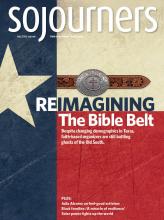IN THE LECTIONARY PASSAGES for these weeks following Pentecost, we find God working in and through the ordinary: a shepherd boy, bread, dancing. In each passage God breaks through with incredible revelation; some promise, some challenge, some person unexpected. Not everyone in the passages notices. Paying attention is crucial. We’ll have to be open to being caught off guard, being surprised. The Holy Spirit gives us eyes to see. As we engage in leadership and ministry these weeks, what we are sure to find is Jesus showing up in all the places we might not expect, when we’re washing dishes, driving in the car, eating a meal. And we certainly don’t expect him in the faces of the white poor, in the lives of racially profiled black youth, or in the stories of the undocumented.
We bring into worship our vestments, our commentaries, our manuscripts. God speaks through these—no surprise there. But God grips us in these unexpected places. These are what we should carry with us into worship every Sunday. But we will need more than eyes to make them preach; we’ll need power. The Holy Spirit gives that too. It makes the heart come alive. The gospel artist Fred Hammond said it best: “When the Spirit of the Lord comes upon my heart, I will dance like David danced!” Dancing and singing shape the heart of God’s new community, for joy, for freedom, for hope. May we be open to the Spirit’s vision and boldness!
Read the Full Article

